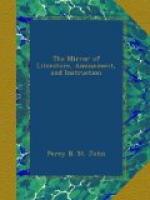of the principal noblemen. Perhaps the rapidity
with which their design was framed, tended much to
its concealment. Scarcely a little month had elapsed
since its first projection, and now the following day
was to destroy the constitution of Venice, to deluge
her streets with patrician blood, and to pluck up
all her ancient stocks from their very roots, without
a suspicion of the approaching calamity having glanced
across the intended victims.—Either the
Council of X could not yet have obtained its subsequent
fearful and extraordinary ubiquity, or the conspirators
must have exhibited a prudence and self-control rarely,
if ever, paralleled by an equally large body of men,
engaged in a similar attempt. To their minor
agents, their ultimate design had not been revealed;
and even in the end, the discovery arose not from
treachery, nor from incaution, but from “a compunctious
visiting” of one framed of stuff less stern than
his associates, and who shrank from the murder of a
benefactor. The part played by Tresham in that
yet more bloody conspiracy, which the Papists, in
after days, framed against the three estates of England,
was but a repetition of that now enacted in Venice
by Beltramo of Bergamo. Beltramo had been brought
up in a noble family, to which he was closely attached,
that of Nicolo Lioni, of San Stefano; and, anxious
to preserve his patron’s life, he went to him
on the evening before the rising, and entreated him
to remain at home on the morrow. The singular
nature of the request excited surprise, which was
increased to suspicion by the ambiguous answers returned
to farther inquiries which it suggested. By degrees,
every particular of the treason was revealed; and Lioni
heard of the impending danger with terror, and of
the hands by which it was threatened, with astonishment
and slowly-accorded belief. Not a moment was
to be lost; he secured Beltramo, therefore, and, having
communicated with a few friends, they resolved upon
assembling the heads of the different magistracies,
and immediately seizing such ringleaders as had been
denounced. These were taken, at their own houses,
without resistance. Precautions were adopted
against any tumultuous gathering of the mechanics
of the Arsenal, and strict orders were issued to the
keeper of the
Campanile not on any account to
toll the bells.
In the course to be pursued with the lesser malefactors,
no difficulty was likely to arise: the rack and
the gibbet were their legal portion. But for
the doge, the law afforded no precedent; and, upon
a crime which it had not entered into the mind of
man to conceive (as with that nation which, having
never contemplated parricide, had neglected to provide
any punishment for it), no tribunal known to the constitution
was competent to pass judgment. The Council of
X. demanded the assistance of a giunta of twenty
nobles, who were to give advice, but not to ballot;
and this body having been constituted, “they
sent for my Lord Marino Faliero the Duke, and my Lord
was then consorting in the palace with people of great
estate, gentlemen, and other good men, none of whom
knew yet how the fact stood.”




